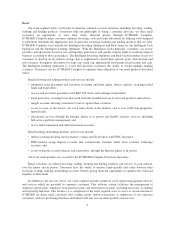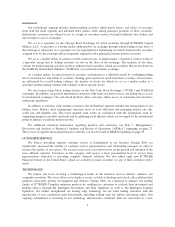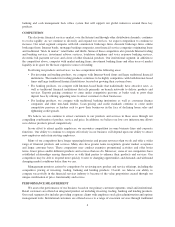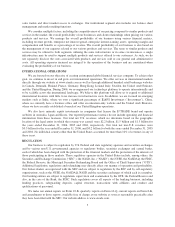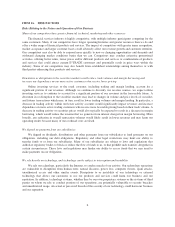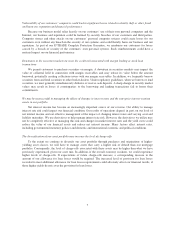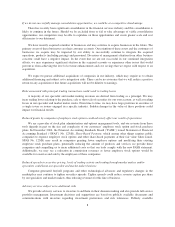eTrade 2006 Annual Report Download - page 15
Download and view the complete annual report
Please find page 15 of the 2006 eTrade annual report below. You can navigate through the pages in the report by either clicking on the pages listed below, or by using the keyword search tool below to find specific information within the annual report.We may incur additional indebtedness in the future, including in connection with further acquisitions. Our
level of indebtedness, among other things, could:
• make it more difficult or costly for us to obtain any necessary financing in the future for working capital,
capital expenditures, debt service requirements or other purposes;
• make it more difficult to refinance outstanding debt;
• limit our flexibility in planning for, or reacting to, changes in our business; or
• make us more vulnerable in the event of a downturn in our business.
The market price of our common stock may continue to be volatile
From January 1, 2004 through December 31, 2006, the price per share of our common stock ranged from a
low of $9.51 to a high of $27.76. The market price of our common stock has been, and is likely to continue to be,
highly volatile and subject to wide fluctuations. In the past, volatility in the market price of a company’s
securities has often led to securities class action litigation. Such litigation could result in substantial costs to us
and divert our attention and resources, which could harm our business. Declines in the market price of our
common stock or failure of the market price to increase could also harm our ability to retain key employees,
reduce our access to capital and otherwise harm our business.
We may need additional funds in the future, which may not be available and which may result in dilution of the
value of our common stock
In the future, we may need to raise additional funds via debt and/or equity instruments, which may not be
available on favorable terms, if at all. If adequate funds are not available on acceptable terms, we may be unable
to fund our plans for the growth of our business. In addition, if funds are available, the issuance of equity
securities could dilute the value of our shares of our common stock and cause the market price of our common
stock to fall.
We have various mechanisms in place that may discourage takeover attempts
Certain provisions of our certificate of incorporation and bylaws may discourage, delay or prevent a third
party from acquiring control of us in a merger, acquisition or similar transaction that a shareholder may consider
favorable. Such provisions include:
• authorization for the issuance of “blank check” preferred stock;
• provision for a classified Board of Directors (“Board”) with staggered, three-year terms;
• the prohibition of cumulative voting in the election of directors;
• a super-majority voting requirement to effect business combinations or certain amendments to our
certificate of incorporation and bylaws;
• limits on the persons who may call special meetings of shareholders;
• the prohibition of shareholder action by written consent; and
• advance notice requirements for nominations to the Board or for proposing matters that can be acted on
by shareholders at shareholder meetings.
Attempts to acquire control of the Company may also be delayed or prevented by our stockholder rights plan,
which is designed to enhance the ability of our Board to protect shareholders against unsolicited attempts to
acquire control of the Company that do not offer an adequate price to all shareholders or are otherwise not in the
best interests of the Company and our shareholders. In addition, certain provisions of our stock incentive plans,
management retention and employment agreements (including severance payments and stock option acceleration),
and Delaware law may also discourage, delay or prevent someone from acquiring or merging with us.
12


